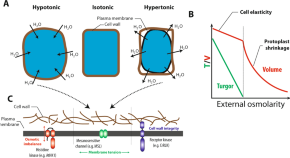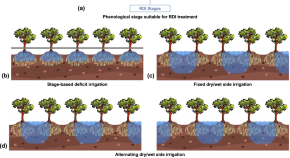
Collection
Drought and osmotic stress signaling in plants
- Submission status
- Closed
Fresh water scarcity is one of the major global problems. As global temperatures rise, we encounter increased variability in amounts and distribution of precipitation, and enhanced susceptibility to water scarcity. Plants control water loss in response to changes in the environment. Under drought conditions, for instance, the plant hormone abscisic acid rapidly triggers an array of cellular responses. The study of plant cell signaling has discovered molecular components that play an important role in the drought and osmotic stress responses. Furthermore, many studies have shown that the control of cellular signaling can be manipulated by modifying signal transduction components to improve tolerance to drought that often comes with osmotic stress. To fully understand the dynamic physiological changes in plants that respond to drought and osmotic stress, it is necessary to obtain detailed information on cellular signaling.
This special issue will highlight i) comprehensive expression/omics analyses at the systems level, ii) complex cellular signaling events involving Ca2+, reactive oxygen species, and plasma membrane proteins etc., iii) crosstalk with other stress responses and developmental signaling, and iv) translational research that helps to develop practical strategies for improving tolerance of crops to drought and osmotic stress.
Submission instructions
Before submitting your manuscript, please ensure you have carefully read the Submission Guidelines for Stress Biology. The complete manuscript should be submitted online through: https://www.editorialmanager.com/sbio
To ensure that you submit to the correct special issue, please select the appropriate special issue title under the 'Additional information' tab upon submission. In addition, indicate within your cover letter that you wish your manuscript to be considered as part of the special issue 'Drought and osmotic stress signaling in plants'.
All submissions will undergo rigorous peer review and accepted articles will be published within the journal as a collection.
Editors
-
Dr. June M. Kwak
DGIST, South Korea, jkwak@dgist.ac.kr
-
Dr. Kazuyuki Kuchitsu
Tokyo University of Science, Japan, kuchitsu@rs.tus.ac.jp
-
Dr. Nathalie Leonhardt
Aix-Marseille Université, CEA and CNRS, France, nathalie.leonhardt@cea.fr
Articles (3 in this collection)
-

-
Root osmotic sensing from local perception to systemic responses
Authors (first, second and last of 5)
- Lucille Gorgues
- Xuelian Li
- Philippe Nacry
- Content type: Review
- Open Access
- Published: 05 September 2022
- Article: 36

-
Regulated deficit irrigation: an effective way to solve the shortage of agricultural water for horticulture
Authors (first, second and last of 6)
- Bohan Yang
- Peining Fu
- Yulin Fang
- Content type: Review
- Open Access
- Published: 25 July 2022
- Article: 28



